-
 Art of Wellness Acupuncture & Traditional Chinese Medicine (TCM)11704 Wilshire Blvd, Suite 295, Los Angeles, CA, 90025
Art of Wellness Acupuncture & Traditional Chinese Medicine (TCM)11704 Wilshire Blvd, Suite 295, Los Angeles, CA, 90025
myartofwellness@gmail.com310-451-5522 Office Hours
MonClosedTue7:30 am --4 pmWed7:30 am --4 pmThu7:30 am -- 4 pmFri7:30 am -- 4 pmSat7:30 am -- 4 pmSunClosedOur office opens from Tuesdays to Saturdays 7:30 am to 4 pm, will be closed on Memorial day, Independent day, Labor day, Thanksgiving day, Christmas and New year.
-
Recent Posts
- How to Treat De Quervain’s Tenosynovitis With Acupuncture and TCM
- Chinese New Year 2026: Year of the Horse
- Acupuncture and TCM Treatment for Perimenopause Symptoms
- How to Treat Insulin Resistance With Acupuncture and TCM
- How to Treat Metabolic Syndrome With Acupuncture and TCM
- How to Treat Syncope With Acupuncture and TCM
- How to Treat Thoracic Outlet Syndrome With Acupuncture and TCM
- How to Treat Dupuytren’s Contracture With Acupuncture and TCM
- How to Treat Nutcracker Syndrome With Acupuncture and TCM
- How to Treat Rosacea With Acupuncture and TCM
- How to Treat Perioral Dermatitis With Acupuncture and TCM
- Lymphatic Drainage With Acupuncture and TCM
- How to Treat Turf Toe With Acupuncture
- How to Treat Nerve Pain With Acupuncture and TCM
- How to Treat Watery Eyes With Acupuncture and TCM
- How to Treat Ovarian Cysts With Acupuncture and TCM
- Sign up to receive news and updates and get my free report:“The Top 10 Reasons to Try Acupuncture”

December 2025 M T W T F S S 1 2 3 4 5 6 7 8 9 10 11 12 13 14 15 16 17 18 19 20 21 22 23 24 25 26 27 28 29 30 31
kidney
How to Treat Chronic Kidney Disease (CKD) With Acupuncture and TCM
By Qineng Tan, L.Ac., Ph.D. and Xiaomei Cai, L.Ac., Ph.D.
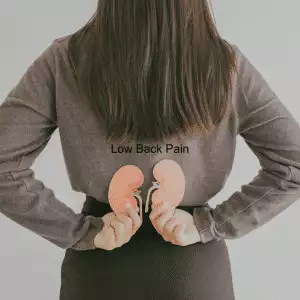
Foamy pee, or bubbles in urine? Urinary frequency, or maybe peeing less than usual? Swollen hands and feet? Low back pain? Fatigue? These can be symptoms of chronic kidney disease, or CKD. Acupuncture and TCM can help relieve CKD symptoms and improve kidney health.
Chronic kidney disease (CKD) is a long-term condition characterized by a gradual loss of kidney function over time.
The kidneys play a vital role in filtering waste and excess fluids from the blood, which are then excreted through urine. When the kidneys are damaged, they cannot perform these functions efficiently, leading to a buildup of waste and fluid in the body.
Common symptoms of CKD include foamy urine, foamy pee, bubbles in urine, peeing more or less than usual, fatigue, edema, and swollen hands and feet. Recognizing these symptoms early is crucial for managing and slowing the progression of CKD.
There are different stages and types of CKD, each with varying degrees of kidney damage and associated symptoms. Early stages may present with mild symptoms such as changes in urination patterns, such as foamy urine or peeing more or less than usual.
As CKD progresses, individuals may experience more severe symptoms, including fatigue, swelling in the hands and feet (edema), and even high blood pressure. CKD can be caused by various underlying conditions, including diabetes, hypertension, and glomerulonephritis.
Each type of CKD has its unique characteristics and requires specific management approaches to prevent further kidney damage.
Acupuncture and TCM offer an adjunct or alternative treatment for CKD that can help not only to relieve kidney disease symptoms, but address the root cause of kidney problems.
Types of Chronic Kidney Disease (CKD)

While all types of CKD are related to poor kidney function, different kinds of chronic kidney disease develop due to a variety of factors. Some of the most common causes of kidney disease include:
- Diabetic Kidney Disease, or Diabetic Nephropathy: This type of CKD is caused by damage to the kidneys due to diabetes. About half of all people with Type 2 diabetes also develop CKD. High blood sugar levels can harm the blood vessels in the kidneys, leading to reduced kidney function over time. High blood pressure, swelling of hands and feet, shortness of breath, and loss of appetite are potential symptoms of diabetic nephropathy. The combination of diabetes and CKD can lead to other complications, including retinopathy, gastroparesis, neuropathy, sleep disorders, sexual dysfunction, and cognitive decline.
- Glomerulonephritis: This is a group of diseases that cause inflammation and damage to the tiny capillaries called glomeruli; these are where waste is filtered out of the blood. This can be caused by infections, autoimmune diseases, or other underlying conditions. Symptoms of glomerulonephritis can include blood in urine, nausea, skin rash, joint pain, swollen face or swelling in legs, jaundice, and troubling breathing.
- Polycystic Kidney Disease (PKD): PKD is a genetic disorder that causes fluid-filled cysts to form in the kidneys. These cysts can enlarge the kidneys and reduce their function over time. PKD symptoms can include: pain in side or back pain, sense of fullness in the abdomen, headaches, and kidney stones.
- Interstitial Nephritis, or tubulointerstitial nephritis: This type of CKD involves inflammation and swelling around the tubules in the kidneys. It can be caused by infections, allergic reactions to medications, long-term overuse of pain medications (analgesic nephropathy), or autoimmune disease, such as Kawasaki disease. Symptoms of Interstitial Nephritis can include: fever, blood in pee, nausea and vomiting, drowsiness, and mental confusion.
- Chronic Pyelonephritis: This is a chronic inflammation of the kidney tissue, often due to repeated bacterial kidney infections, or UTIs. This condition most commonly presents in people, who have a structural abnormality that causes urinary obstructions that can lead to vesicoureteral reflux, when urine from the bladder backs up into the ureters and kidneys. Chronic kidney stones, or enlarged prostate can also cause pyelonephritis, as can urinary procedures like cystoscopic exam or catheterization. Painful, burning sensation when urinating, fever, bloody urine, fishy-smelling urine, and pain in the low back or groin pain can all be signs of chronic pyelonephritis.
Recognizing the symptoms and understanding the different types of CKD can help individuals seek treatment earlier and adopt lifestyle changes to help manage the disease effectively.
Acupuncture treatment and other TCM modalities, herbs and nutrition, can be very helpful for managing CKD and its symptoms.
Top 10 Chronic Kidney Disease (CKD) Symptoms
Many people are suffering from chronic kidney disease without being aware of it. The symptoms of CKD can vary widely, and often don’t show up until chronic kidney disease has progressed to more serious stages. Some of the most common symptoms of chronic kidney disease include:
- Foamy Urine or Bloody Urine: Presence of bubbles or foam in the urine, indicating excess protein. Some types of CKD may also cause there to be blood in urine. Fishy-smelling urine can also be a symptom of some types of kidney disease.
- Changes in Urination: Peeing more or less than usual, which can include frequent nighttime urination or reduced urination.
- Fatigue: Persistent tiredness and lack of energy due to the buildup of waste products in the body.
- Edema: Swelling in the hands, feet, ankles, or face caused by fluid retention.
- Shortness of Breath: Difficulty breathing due to fluid buildup in the lungs.
- High Blood Pressure: Hypertension that is difficult to control, which is associated with kidney damage.
- Nausea and Vomiting: Feeling sick to the stomach, which can be a result of toxin buildup in the blood.
- Loss of Appetite: Lack of desire to eat, which can often be accompanied by unwanted weight loss.
- Muscle Cramps: Painful muscle contractions, usually due to electrolyte imbalances.
- Itchy Skin: Persistent itching caused by the accumulation of waste products in the body.
Low back pain, groin pain, and joint pain call all be symptoms of certain kinds of CKD.
People with CKD are more likely to have develop gastroparesis, weak stomach contractions that cause acid reflux, or regurgitation.
These symptoms can vary in severity and may develop gradually as kidney function declines. Early detection and management of CKD are crucial to slow the progression of the disease and maintain kidney health.
Can Acupuncture Help Chronic Kidney Disease?
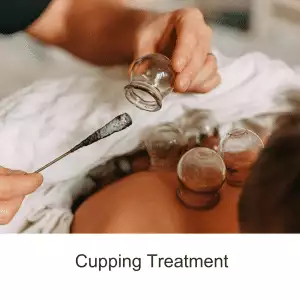
In TCM, the kidneys are considered the foundation of life, responsible for storing vital essence (known as “jing”) and governing water metabolism, growth, and reproduction. TCM practitioners diagnose CKD by carefully observing and evaluating symptoms, as well as checking a patient’s pulse and tongue to determine the specific imbalance affecting the kidneys.
Acupuncture involves inserting fine needles into specific points on the body to balance the flow of qi (life force energy) and promote healing. Studies have shown acupuncture can improve kidney function, reduce proteinuria (excess protein in urine), and alleviate symptoms like fatigue and edema in CKD patients.
Acupuncture is also beneficial for lowering blood pressure and managing side effects from conventional treatments like dialysis.
Chinese herbs are often used in individually tailored formulas to address the underlying imbalances contributing to CKD. Herbs like Rehmannia glutinosa and Astragalus membranaceus are a few specific herbs that have been found effective in improving kidney function and reducing inflammation. Herbal formulas are combined based on each patient’s specific condition and symptoms.
TCM dietary recommendations focus on foods that support kidney health and balance yin and yang energies. A diet rich in fruits, vegetables, grains, and legumes, while avoiding high-salt, high-sugar, and animal protein-rich foods, is suggested to alleviate symptoms and prevent further kidney damage,
Other TCM treatment for CKD might include moxibustion (burning a herb called mugwort near acupuncture points to stimulate circulation), cupping (creating suction on the skin to promote qi flow), which can help remove excess fluids and toxins from the kidneys, and gua sha (scraping the skin to stimulate circulation). These therapies can help improve kidney function, reduce inflammation, and relieve pain.
By addressing the root causes and symptoms of CKD through a combination of acupuncture, herbal medicine, dietary adjustments, and other therapies, TCM offers a comprehensive approach to managing chronic kidney disease and supporting overall kidney health.
Acupuncture Near Me for Chronic Kidney Disease in Los Angeles
The TCM view of kidney function allows experienced practitioners like Dr. Tan and Dr. Cai at Art of Wellness to help patients with chronic kidney disease to optimize their health while relieving symptoms. If you or someone you love is suffering from kidney disease, it can be helpful to add acupuncture and herbs as an adjunct treatment for CKD in addition to conventional medicine.
*This article is for education from the perspective of Traditional Chinese Medicine only. The education provided by this article is not approved by FDA to diagnose, prevent, treat and cure human diseases. It should not stop you from consulting with your physician for your medical conditions. Traditional Chinese Medicine is based on Qi, which is an invisible force that usually cannot be observed by modern science. Because science focuses on testing ideas about the natural world with evidence obtained through observation, these aspects of acupuncture can’t be studied by science. Therefore acupuncture and Chinese herbs are often not supported by double-blind, randomized trials, and they are considered alternative medicine therapies in the United States.
How to Treat Edema With Acupuncture and TCM
By Qineng Tan, L.Ac., Ph.D. and Xiaomei Cai, L.Ac., Ph.D.

Swollen feet and ankles? Fluid retention in legs? These are signs of edema. Acupuncture and TCM offer natural diuretic herbs and alternative treatment for swelling in legs and feet.
Edema refers to when excess fluid in body tissues, or water retention, leads to swelling. Edema most commonly causes swollen ankles and swollen feet. But edema can occur in many parts of the body.
Blood vessels have tiny valves that work to push blood from the lower body back up to the heart. When this process isn’t working properly, blood and other fluids will gather in the legs and cause swollen feet and ankles.
Edema causes puffiness under the skin, and when you press on the skin, it leaves an imprint. The skin may be shiny and stretched because of water retention.
Other edema symptoms can include a feeling of heaviness in the legs, and a swollen belly or distended abdomen.
Everyone experiences edema once in a while; for example, after a long airplane flight, which causes fluids to pool in the legs and feet, or the day after eating particularly salty foods, which can cause water retention. Edema is also common during pregnancy, when increased blood volume and pressure from the growing uterus can cause edema in the legs.
Occasional edema can often be prevented or remedied by reducing salt intake, drinking more water, and wearing compression garments.
Some health conditions can cause edema, in which case, both the underlying issue and the edema itself need to be addressed.
Acupuncture and Chinese herbs can help relieve swollen ankles and feet due to water retention, as well as helping to address the root cause of edema.
Causes of Edema
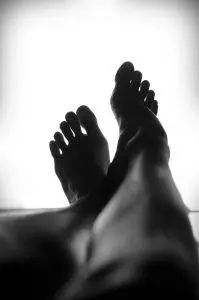
Edema can happen when a person stays in one position for a long time and fluids build up in the lower body due to gravity. This type of swelling can be helped by getting up and moving around regularly and/or wearing compression socks that prevent water retention from causing swollen ankles and feet.
Cardiovascular issues having to do with heart function or the health of blood vessels can cause edema. When the heart doesn’t pump blood effectively, it can cause fluid buildup in the legs, ankles, and feet. Venous insufficiency, or weakness in the veins, can prevent blood from being pushed back to the heart properly, which leads to varicose veins and blood buildup in the legs.
Kidney disease and liver disease can contribute to edema. Damaged kidneys are less able to remove excess fluid, leading to swelling. Conditions like cirrhosis can increase pressure in blood vessels and reduce proteins that keep fluid in the bloodstream, causing edema.
Blocked or damaged lymph nodes can prevent lymph fluid from draining well, causing localized edema. This is known as lymphedema. Lymphedema can be related to cancer treatments, when lymph nodes are removed.
People may experience edema after a stroke or cardiac event like a heart attack.
Side effects from some drugs, including those for high blood pressure and corticosteroids, can cause fluid retention.
Conditions such as cellulitis or arthritis can cause inflammation and localized swelling.
When there are underlying conditions like cirrhosis, kidney problems, and vascular issues, they must be addressed in order to resolve the edema.
Treatment for Swollen Legs and Feet
Conventional medical treatments for edema typically focus on addressing the underlying cause and managing symptoms. Typical medical treatment for edema may include:
- Diuretics to help the body expel excess fluid through urine.
- Compression stockings to help reduce swelling by promoting fluid movement in the legs.
- Elevating the affected limbs above the level of the heart can help reduce swelling.
- Lowering sodium in the diet can help prevent fluid retention.
- Regular exercise to improve circulation and help reduce swelling.
- Addressing heart, kidney, or liver issues can help manage edema.
Using diuretic medications may seem to alleviate swelling in the short term, but these drugs create a kind of dependency. As soon as a person stops taking the diuretics, the water retention will return.
Chinese herbal formulations can act as natural diuretics, while addressing the root cause of edema.
By integrating acupuncture and TCM into your treatment plan, you may find a holistic approach that addresses not only the symptoms of edema but also its cause, providing lasting relief from edema swelling.
Can Acupuncture Help Edema?

TCM theory for the treatment of edema goes back over 2000 years. The Yellow Emperor wrote about edema treatment in his medical text before 100 B.C., describing the disruption of fluid movement in the body. In the second century A.D., another well-known Chinese doctor Zhang Zhong-Jing detailed treatments for edema with herb formulas, which are still considered classics today.
Edema can be related to imbalances in Yin and Yang. Yin edema affects the spleen and kidneys, while Yang edema affects the spleen and lungs. Yin edema symptoms tend to start in the lower body, with swollen feet and ankles, while Yang edema symptoms tend to start in the upper body, with the tendency to have tight, shiny skin.
According to TCM, the organ systems of the Spleen, Kidneys, and Lungs must be balanced in order to restore proper functioning of fluid metabolism. An acupuncture treatment protocol would be directed towards clearing wind, heat, dampness, and other pathogenic forces, while balancing Yin and Yang, and regulating Qi and Blood.
Different pathologies of edema can be described by TCM diagnoses, including:
- Blood stasis
- Qi stagnation
- Damp heat
- Heat toxins
- Wind-cold or Wind-heat in the lungs
Recent research shows that ancient herb formulas can help regulate fluids and have a positive effect on vascular function.
Moxibustion, a TCM modality that involves warming acupoint areas by burning mugwort herb near the skin, is often used to help relieve edema. Moxa treatment can help improve blood flow by warming and dispersing dampness and phlegm and invigorating the spleen and kidneys.
One study of patients suffering from swelling in legs and ankles showed that moxibustion helped relieve swelling in the legs.
Breast cancer treatment often involves radiation treatment that affects the lymph nodes, or the removal of lymph nodes, which can lead to lymphedema. This type of lymphedema often affects one arm, or both arms. It can also affect other parts of the body.
One study involved using acupuncture treatment twice a week to help relieve lymphedema after cancer treatment. More than half of the patients experienced a significant improvement in lymphedema, as measured by arm circumference. The conclusion was that acupuncture is a safe treatment that can help reduce swelling.
Acupuncture treatment improves blood flow and the movement of fluids in general, while nourishing the kidneys and spleen. Moxibustion can be used to further stimulate the flow of blood and Qi.
Acupuncture Near Me for Edema in West Los Angeles
Edema is a common problem, but it requires an individualized approach, as it can have many different root causes. Experienced acupuncture practitioners like Dr. Tan and Dr. Cai at Art of Wellness in Westwood, CA can help patients find relief from edema swelling and water retention in legs through a combination of acupuncture, moxa, herbs, and personalized nutrition counseling.
*This article is for education from the perspective of Traditional Chinese Medicine only. The education provided by this article is not approved by FDA to diagnose, prevent, treat and cure human diseases. It should not stop you from consulting with your physician for your medical conditions. Traditional Chinese Medicine is based on Qi, which is an invisible force that usually cannot be observed by modern science. Because science focuses on testing ideas about the natural world with evidence obtained through observation, these aspects of acupuncture can’t be studied by science. Therefore acupuncture and Chinese herbs are often not supported by double-blind, randomized trials, and they are considered alternative medicine therapies in the United States.
How to Treat Pruritus With Acupuncture and TCM
By Xiaomei Cai, L.Ac., Ph.D. and Qineng Tan, L.Ac., Ph.D.
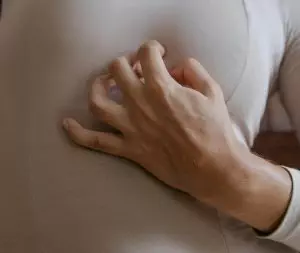
Itchy skin, hives all over the body, or skin rashes that itch? Pruritus, commonly known as itching, is an irritating and persistent condition that affects many people. Acupuncture and TCM herbs can offer a holistic approach to alleviate itching.
Pruritus is simply a medical term that means “itching,” or that feeling that you need to scratch your skin. It can refer to itchy skin on one part of the body, or systemic itching that feels like it moves around or affects the whole body. The sensation can be mild, even ticklish, or painful and constant to the point that it is debilitating.
The sensation of itching all over body can significantly impact one’s quality of life, as it can be painful, distracting, and make it difficult to concentrate, relax, or sleep.
Persistent itching requires treatment that takes many possible underlying factors into consideration. This is why acupuncture and TCM can be a good alternative treatment for pruritus.
What Causes Pruritus?
Pruritus can stem from various causes. It can be a primary condition, arising due to a skin problem or skin allergy, such as:
- Atopic dermatitis
- Dermatitis herpetiformis
- Psoriasis
- Eczema
- Hives, urticaria
- Folliculitis
- Dry skin
- Hemorrhoids
- Head lice infestation
Pruritus can also be caused by many other conditions, such as nerve damage, renal disorders that require dialysis, blood diseases like polycythemia vera, hepatitis, liver cirrhosis, infections like chicken pox and shingles, HIV, thyroid disorders, MCAS, pregnancy and perimenopause.
Top 10 Pruritus Causes
Because the sensation of itching, like that of pain, can be influenced by so many factors, there are many possible causes of pruritus. Itchy skin can be caused by a wide variety of conditions, including:
- Allergic Reactions: Common allergens include certain foods, medications, and insect stings or bites. Immune system disorders like MCAS can cause pruritus.
- Dermatitis: Conditions like atopic dermatitis (eczema) and contact dermatitis can lead to persistent itching.
- Skin Infections: Bacterial, viral, and fungal infections can cause itching.
- Dry Skin (Xerosis): Often exacerbated by environmental factors, dry skin can cause itching.
- Internal Diseases: Liver disease, chronic kidney disease, thyroid problems, and certain cancers can cause systemic itching. Chronic kidney disease that require dialysis treatment, in particular, can cause a condition known as Uremic Pruritus.
- Nervous System Disorders: Conditions such as multiple sclerosis, pinched nerves, and postherpetic neuralgia can lead to pruritus. Brachioradial pruritus, for example, is a condition in which irritation of the cervical nerves (C5-C8) causes itching on one or both of the the upper arms.
- Mental Health Issues: Stress, anxiety, and obsessive-compulsive disorder can manifest with itching.
- Pregnancy: Some women experience pruritus during pregnancy due to hormonal changes.
- Perimenopause: Some women experience pruritus during perimenopause and menopause due to a reduction in estrogen levels.
- Reactions to medications: Many drugs can cause pruritus as a side effect, including antibiotics like penicillin, amoxicillin, erythromycin, blood pressure medications, statins, or cholesterol medications, analgesics like aspirin, and tricyclic antidepressants.
Treatment for Pruritus

Conventional medicine typically treats pruritus by trying to find and address the underlying cause, while using medications to alleviate the symptom of itching. This may include topical treatments like over-the-counter or prescription creams and ointments that contain corticosteroids, menthol, or capsaicin to soothe the skin and reduce inflammation. These creams may help relieve localized itching for a time, but they cannot do much to control widespread, systemic itching.
Antihistamines, such as diphenhydramine or cetirizine, may be prescribed to reduce allergic reactions and relieve itching. These can be helpful in some acute cases of pruritus, but again, they do not resolve the problem of chronic itching. Overall, most people with chronic pruritus do not get adequate relief from antihistamine treatment for itching.
For severe itching, oral corticosteroids or immunosuppressants may be prescribed to reduce inflammation and immune response.
TCM and acupuncture can be an effective alternative or adjunct treatment for itching, as TCM addressed both underlying conditions and the symptoms of itchy skin.
Can Acupuncture Help Pruritus?
TCM methods like acupuncture and moxibustion have been used for over 2000 years to help relieve itchy skin conditions and systemic pruritus. Now, scientific research is beginning to show that Chinese medicine is an effective alternative treatment for itching.
The mechanisms that cause the sensation of itching often stem from the brain and the peripheral nervous system. Acupuncture has been shown to have an effect on the nervous system, and specifically, to help reduce the activation of the itch response in the brain.
Itching responses are also activated by the behavior of mast cells, like cytokines. Acupuncture, particularly electroacupuncture, has been shown to help regulate the activity of cytokines, which can help reduce inflammation and sensation.
Acupuncture is well known, now, to help relieve pain by stimulating receptors in the brain. This same action can help to reduce itchy sensations, as well as pain.
The chemical and mechanical activations that cause itching can lead to a chronic problem referred to as the “itch-scratch vicious cycle,” which occurs because of a neural loop in the spinal cord. Acupuncture can potentially help to disrupt this chronic loop of activations that causes the urge to scratch.
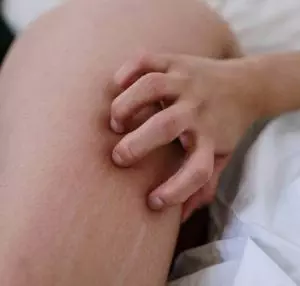
Acupuncture and TCM herbal remedies can also help to clear up skin conditions that are directly causing itching, and can help to address deeper underlying conditions, such as liver and kidney ailments, that can be the secondary cause of systemic itching.
Uremic pruritus, which is associated with dialysis treatment for chronic kidney disease or renal failure, affects many people. This type of pruritus can cause sleep problems and affect patients on a daily basis and is believed to be caused by severe dryness of the skin, along with sweating, and chronic inflammation. It may also be related to opioid receptors and inappropriate nerve signaling that triggers the release of cytokines. A review of studies about acupuncture treatment for chronic kidney disease suggests that TCM is highly effective for reducing itching related to uremic pruritus.
One specific study looked at patients undergoing dialysis who were given acupressure treatment. The conclusion was that acupressure was both helpful for relieving itching and cost effective as a treatment alternative.
Acupuncture treatment has an impact not only on the autonomic nervous system, but also on histamine release, and studies have shown that acupuncture is more effective at controlling histamine-related itching than many antihistamine medications.
One study done with 16 patients suffering from brachioradial pruritus (itching on the upper arm/s) found that the majority experienced total resolution of their itching, while the remaining patients experienced partial relief of itching.
Acupuncture Near Me for Pruritus in West Los Angeles
Acupuncture can be beneficial for itchy skin conditions like hives, dermatitis, and rashes. During pregnancy and perimenopause, acupuncture can help balance hormones to relieve itching and insomnia. Acupuncture can also help relieve anxiety, PTSD and panic disorders that can sometimes exacerbate itching sensations. Liver problems, kidney problems, and side effects of cancer treatment can all be addressed with TCM, which may help relieve persistent pruritus.
*This article is for education from the perspective of Traditional Chinese Medicine only. The education provided by this article is not approved by FDA to diagnose, prevent, treat and cure human diseases. It should not stop you from consulting with your physician for your medical conditions. Traditional Chinese Medicine is based on Qi, which is an invisible force that usually cannot be observed by modern science. Because science focuses on testing ideas about the natural world with evidence obtained through observation, these aspects of acupuncture can’t be studied by science. Therefore acupuncture and Chinese herbs are often not supported by double-blind, randomized trials, and they are considered alternative medicine therapies in the United States.
How To Treat Addison’s Disease With Acupuncture and TCM
By Qineng Tan, L.Ac,. Ph.D. and Xiaomei Cai, L.Ac., Ph.D.

Always tired? Craving salty foods? Thirsty all the time? Adrenal fatigue? Addison’s disease is a condition in which the adrenal glands do not produce enough cortisol. Acupuncture and TCM can help to balance the adrenal hormones and relieve adrenal insufficiency symptoms.
Addison’s, also known as adrenal insufficiency, happens because of damage to the adrenal glands. What do the adrenal glands do? The adrenals are small glands that are located just above the kidneys. They produce hormones, including cortisol and aldosterone. These hormones are important in metabolic functions, and are also a big part of our stress response.
Cortisol is released from the adrenal glands into the bloodstream, and it aids in the body’s use of macronutrients: protein, carbohydrates, and fats. Cortisol regulates blood pressure and blood sugar levels, and it also gives us an extra energy boost when we need it because of sudden and/or stressful circumstances.
In many cases, Addison’s disease is the result of an autoimmune disorder. In these cases, the immune system mistakenly attacks the adrenal cortex, the part of the adrenal glands that produce cortisol and aldosterone.
In some parts of the world, tuberculosis infection is still common, and tuberculosis can lead to damage of the adrenal glands.
Other infectious diseases like HIV/AIDS, or fungal infections like histoplasmosis, can cause adrenal damage.
People with other autoimmune diseases may be more susceptible to developing Addison disorder, too. For example, Addison’s disease can happen concurrently with:
- Dermatitis herpetiformis
- Graves disease
- Type 1 diabetes
- Pernicious anemia
- Hashimoto’s disease, thyroiditis
- Vitiligo
- Myasthenia gravis
Some people may develop Addison’s disease in addition to having hypothyroidism or diabetes.
Addison’s Disease Symptoms
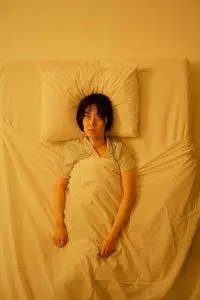
In the early stages, Addison’s disease symptoms may feel like a flu, causing fatigue, muscle weakness and joint pain. But as the illness progresses, these symptoms may become chronic.
Adrenal insufficiency symptoms include:
- Extreme fatigue
- Dehydration
- Loss of appetite
- Unexplained weight loss
- Darkening of skin in areas, hyperpigmentation, darkening of gums
- Blue-black color to skin around mouth, nipples, or genitals
- Low blood pressure, hypoglycemia
- Dizziness
- Fainting, light-headedness
- Craving salt
- Abdominal pain
- Nausea, vomiting
- Diarrhea
- Joint pain
- Muscle pain
- Depression
- Irritability
- Loss of body hair
- Sexual problems
- Irregular periods, no menstrual periods, missed periods
Primary ovarian insufficiency (POI), has been found to be more common among those with Addison’s disease, with about 1 in 10 women with Addison’s going through early menopause (before 40).
In extreme situations, Addison’s sickness can lead to kidney failure, or going into shock. Early warning signs of adrenal crisis include nausea, fever, headache, and confusion. This sudden worsening of Addison’s disease is known as Adrenal crisis, and requires immediate medical attention.
Medical Treatment for Addison’s Disease
Accurate diagnosis and appropriate treatment are crucial for individuals with Addison’s disease.
A doctor will typically diagnose Addison’s disease through blood tests. These tests measure the levels of cortisol and aldosterone in the blood. Low levels of these hormones are indicative of adrenal insufficiency.
If blood tests suggest adrenal insufficiency, an ACTH stimulation test may be performed. In this test, synthetic adrenocorticotropic hormone (ACTH) is administered, and cortisol levels in the blood are measured. Patients with Addison’s disease typically do not show a significant increase in cortisol after receiving ACTH.
The primary treatment for Addison’s disease involves hormone replacement therapy. Patients are prescribed synthetic cortisol (usually hydrocortisone or prednisone) to replace the insufficient natural cortisol production.
If aldosterone production is also insufficient, patients may be prescribed fludrocortisone to replace this hormone. This helps regulate salt and water balance in the body.
Dosage and frequency of cortisol replacement are adjusted to meet the specific needs of each patient. Patients often need to take multiple doses of medication daily to mimic the body’s natural cortisol rhythms.
These steroid medications can cause side effects like dizziness, nausea, and changes in the menstrual cycle.
Patients with Addison’s disease require ongoing medical supervision to monitor hormone levels, adjust medication as needed, and ensure that they are responding well to treatment.
Acupuncture offers an adjunct or alternative treatment for Addison’s disease that can help regulate hormones.
Can Acupuncture Help Addison’s Disease?
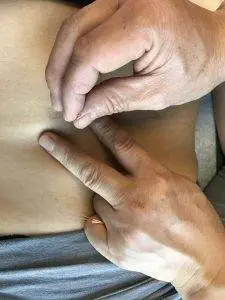
According to TCM theory, the kidneys are responsible for storing and controlling not only Qi, but “essence,” which represents a person’s foundational life force energy.
Addison’s disease, or adrenal insufficiency, is usually related to some variation of kidney deficiency according to TCM diagnosis.
Possible TCM diagnosis for Addison’s might be:
- kidney qi deficiency
- kidney yang deficiency
- kidney yin deficiency
- liver yin deficiency
- spleen blood deficiency
- spleen yang deficiency
By listening to a person’s range of symptoms, an acupuncturist will determine which pattern is emerging, and choose acupuncture points to bring energy and strength to the affected organs.
Moxibustion treatment is also an excellent modality to help build up Kidney Qi and blood.
Chinese herbs can help nourish and support kidney Qi.
For some people, acupuncture treatment and herbal supplements can be a good alternative treatment for Addison’s disease. For others, TCM treatment for adrenal insufficiency can be used as an adjunct to conventional treatment, and help to alleviate side effects of steroids, like dizziness, nausea, or menstrual changes.
Acupuncture Near Me for Addison’s Disease in West Los Angeles
Acupuncture can help address autoimmune diseases that are difficult for conventional medicine to treat. TCM modalities, including moxibustion and herbs, can provide a holistic treatment that works on the root level, restoring proper function of the immune system, as well as helping to relieve all kinds of symptoms.
Addison’s disease requires an individualized approach. Dr. Tan and Dr. Cai at Art of Wellness Acupuncture have over three decades of experience helping patients overcome all types of autoimmune disorders. Art of Wellness was recently named one of the top acupuncture practices in Los Angeles. Please do not hesitate to call us.
*This article is for education from the perspective of Traditional Chinese Medicine only. The education provided by this article is not approved by FDA to diagnose, prevent, treat and cure human diseases. It should not stop you from consulting with your physician for your medical conditions. Traditional Chinese Medicine is based on Qi, which is an invisible force that usually cannot be observed by modern science. Because science focuses on testing ideas about the natural world with evidence obtained through observation, these aspects of acupuncture can’t be studied by science. Therefore acupuncture and Chinese herbs are often not supported by double-blind, randomized trials, and they are considered alternative medicine therapies in the United States.
How to Treat Hashimoto’s Disease With Acupuncture and TCM
By Qineng Tan, L.Ac., Ph.D. and Xiaomei Cai, L.Ac., Ph.D.

Goiter, enlarged thyroid? Tired all the time, feeling weak, sensitive to cold? Constipation, weight gain, hair loss? These can all be hypothyroidism symptoms. Hashimoto’s disease is an autoimmune disorder that causes low thyroid symptoms. Acupuncture and TCM can offer an alternative hypothyroidism treatment and address Hashimoto’s thyroiditis symptoms.
Recent data shows that hypothyroidism is fairly common. In the U.S., where it was previously thought that about 5% of the population may have some signs of hypothyroidism, more recent research shows that that number is over 10%. While people of all ages can have signs of hypothyroidism, it is most common among women over 50.
The thyroid and the pituitary gland work to release various thyroid hormones that control metabolism and other processes. The primary thyroid hormones are thyroxine (T3) and triiodothyronine (T4); Thyrotropin (TSH) is the hormone that stimulates the production of T3 and T4.
The normal TSH level for most adults is in the range of 0.27 – 4.2 uIU/mL. Lower TSH levels are often a sign that the body is producing too much thyroid hormone, which leads to symptoms of hyperthyroidism, which is often due to Graves disease, which is also an autoimmune thyroid disorder.
When TSH levels are high, there is probably too little thyroid hormone, or low thyroid hormone levels. Hypothyroidism is considered “overt” when a person has high TSH levels and low T4 levels. A person is considered to have subclinical hypothyroidism when their TSH is elevated, but T4 is in the normal range.
Hashimoto’s disease, also known as chronic thyroiditis, is the most common cause of hypothyroidism, but because it is a slowly progressing autoimmune disorder, it can take years for symptoms for thyroid to show up.
Hypothyroidism causes, or risk factors for Hashimoto, include: genetics, changes in hormones during pregnancy, and the presence of other autoimmune diseases. It is possible to have Hashimoto’s thyroiditis and also have another autoimmune condition, such as Rheumatoid arthritis, Celiac Disease, Lupus, or Type 1 Diabetes.
In some cases, hypothyroidism can be caused by an iodine deficiency in the diet. This is rare in the U.S., though, and iodine supplementation is not helpful in cases of hypothyroidism that are not caused by a lack of iodine.
Acupuncture and TCM are excellent modalities for treating all kinds of autoimmune disorders, because they work holistically to treat both the root causes of the problem, and hypothyroid symptoms.
Top 10 Hashimoto Disease Symptoms

Signs of thyroid issues can take a long time to become severe enough that people notice them and seek diagnosis and treatment. Hypothyroidism symptoms can just seem like “normal” fatigue or other signs of aging.
Sometimes when people visit their primary care doctor, and they run a typical panel of blood tests, thyroid hormone levels are still in the normal range, so no treatment is recommended.
However, hypothyroidism symptoms typically come on gradually, and will likely get worse with time, as the disease progresses.
Hashimoto’s Disease Symptoms include:
- Fatigue, sluggishness, tired all the time
- Drowsiness, sleepy all the time
- Increased sensitivity to cold, feel cold all the time
- Dry skin, brittle nails, hair loss, puffy face
- Muscle pain, muscle stiffness, muscle weakness, joint pain, stiff joints
- Swollen thyroid, enlarged thyroid gland, goiter, swollen tongue
- Memory problems, difficulty concentrating, foggy head
- Change in menstrual cycle, irregular menstruation, heavy bleeding during period
- Weight gain
- Depression, mental health problems
If hypothyroidism is not treated, it can lead to serious complications. These may include: heart problems or cardiovascular diseases, like irregular heartbeat (arrhythmia) and high cholesterol.
Hashimoto’s can cause problems with sexual function, libido, and fertility in both men and women.
In rare cases, people with untreated low thyroid levels can develop Myxedema. Myxedema is the term for advanced, severe hypothyroidism, which can lead to:
- Low blood pressure
- Low heart rate
- Low blood sodium levels
- Low blood oxygen levels
- Low body temperature (hypothermia)
- Mental confusion
In extreme cases, Myxedema can lead to a health crisis in which a person may go into shock, a coma, or seizures. Myxedema crisis requires immediate emergency care.
Hypothyroidism can develop slowly, with minimal symptoms. However, it is important to get proper diagnosis and treatment for Hashimoto’s thyroiditis. As time goes on, untreated hypothyroidism can lead to more complications.
Medical Treatment for Hashimoto’s Disease
Getting a diagnosis for Hashimoto’s disease will usually involve a series of blood tests. As an autoimmune disorder, Hashimoto involves the production of antibodies that mistakenly attack healthy cells. In the case of Hashimoto’s thyroiditis, an antibody test may show that the immune system is making TSO antibodies. Thyroid peroxidase (TSO) a protein that is vital to the production of thyroid hormone.
In addition, blood tests will show if there is elevated TSH and/or low levels of T4. If a person has symptoms, or an enlarged thyroid gland, and high TSH levels, then a diagnosis of Hashimoto’s may be made, whether or not the T4 levels are low.
An ultrasound can indicate that there is swelling or inflammation in the thyroid gland.
Hypothyroidism Medication
The usual treatment for Hashimoto’s disease is hormone replacement. Levothyroxine, under the brand names Levoxyl, or Synthroid, is usually given in pill form. This hypothyroid medication mimics the action of T4 hormone.
For many patients, medications for low thyroid will help to stabilize the TSH and T4 levels, and symptoms will improve. However, for some people, the continued autoimmune disorder process continues to cause symptoms, even when thyroid hormone levels are in the normal range.
In these cases, doctors may recommend surgery. A thyroidectomy involves the removal of some or all of the thyroid gland. After a thyroid surgery, a person will need to continue taking thyroid hormone replacement medication, as they will not produce any without the thyroid gland.
Acupuncture and TCM treatment offer an alternative or adjunct therapy for Hashimoto’s disease, which can help improve immune function and address symptoms.
Can Acupuncture Help Hashimoto’s?

Acupuncture works by harmonizing the Qi (life force energy) of the organ systems of the body. When Qi is out of balance, then some bodily processes happen in excess, and others are deficient. A TCM practitioner observes and listens carefully to each person’s individual experience of symptoms to discover which organs are out of balance.
In the case of hypothyroidism and Hashimoto’s, deficiency of Qi and blood can be building up over a long period of time, and gradually begin to impact organs: mainly, the kidneys, spleen, and heart.
For a while, while the condition is still what conventional medicine considers to be subclinical hypothyroidism, the spleen Qi is weak, and causes some symptoms, like weakness and fatigue.
Then, as the situation progresses, the kidney Qi is affected, and more symptoms begin to occur. Yang Qi is not able to warm the organs enough, so dampness and cold begin to accumulate. This causes symptoms like constipation, swollen joints, brain fog, and memory problems.
Chronic kidney and liver qi deficiency can cause menstrual problems, and infertility.
If the problem continues, then the heart is affected, too, and cardiovascular symptoms begin to arise, like palpitations, respiratory problems, and low blood pressure.
The acupuncturist deduces from the pattern of symptoms which organs are affected, and then uses acupuncture treatment, herbs, and other modalities like cupping or moxibustion to bring more energy to depleted areas and help nourish them.
Can TCM cure hypothyroidism? Not exactly, but research has shown that acupuncture is a safe and effective treatment for thyroid disorders, whether it is used as an alternative medicine for Hashimoto’s disease, or as an adjunct therapy.
Case studies have shown that regular acupuncture treatment can help stabilize thyroid hormone levels, slow the progression of the autoimmune disease, reduce symptoms, and improve quality of life.
For those who are trying to conceive and are struggling with infertility issues due to thyroid disorders, acupuncture can be a holistic treatment that helps balance hormones and improve fertility. Acupuncture treatment may help prevent miscarriage due to autoimmune conditions.
Acupuncture can also be helpful for pain management after a thyroidectomy procedure.
Acupuncture Near Me for Hashimoto’s Disease – West Los Angeles Area
Acupuncture is an excellent modality for helping to treat many autoimmune diseases and thyroid conditions, including Graves disease, hyperthyroidism, and chronic fatigue syndrome. TCM can also help with menopause and perimenopausal symptoms, which often occur concurrently with hypothyroidism in women over 50. Acupuncture can also help with all kinds of mental health problems like depression and anxiety, which may be related to underlying physical conditions.
*This article is for education from the perspective of Traditional Chinese Medicine only. The education provided by this article is not approved by FDA to diagnose, prevent, treat and cure human diseases. It should not stop you from consulting with your physician for your medical conditions. Traditional Chinese Medicine is based on Qi, which is an invisible force that usually cannot be observed by modern science. Because science focuses on testing ideas about the natural world with evidence obtained through observation, these aspects of acupuncture can’t be studied by science. Therefore acupuncture and Chinese herbs are often not supported by double-blind, randomized trials, and they are considered alternative medicine therapies in the United States.